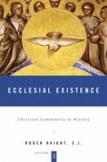Unity Amid Plurality
This is the third and final volume of a historical and systematic overview of comparative theologies of the church. A significant contribution to the contemporary debates on ecclesiology among the churches, it follows two comparative historical volumes, providing a theology “from below.”
As all the churches expand from a Eurocentric heritage, and diversity and pluralism offer both gifts and challenges, treating ecclesial existence from a perspective that is both ecumenically sensitive and culturally comprehensive is an unavoidable responsibility. All the churches make a distinction between the essential elements of ecclesiology given in divine revelation and those important but historically conditioned, changeable nonessentials. The churches and their theologians differ, however, as to where to make the distinction. Roger Haight, S.J., who currently teaches at Union Theological Seminary in New York, makes his own judgments on these matters, and each church and theologian will need to judge for themselves whether his proposals correspond to the “faith of the church through the ages.”
The exposition is based on a carefully worked out methodology and a modest, “transdenominational” perspective that claims to honor the particular ecclesiologies of the churches and to provide a comprehensive, generalized presentation. Such a theology “from below” comes from a developed methodology of the author, grounded in the experiential and historical perspective of Friedrich Schleiermacher.
One does not need to affirm the theory of symbol, the understanding of historical consciousness, the interpretation of pluralism or the visible-invisible distinction put forward by the author to appreciate the historical scope and richness of interdisciplinary perspectives brought to bear on his theology of the church. He treats the themes of nature, mission, organization, membership, activities of the church and its relationship to the world in the context of this carefully crafted methodology and set of presuppositions, ending with a proposal about the relationships among the churches.
Even while claiming to write an ecclesiology that is drawn from a generalized comparative approach of the theologies of the churches and their biblical and historical sources, Haight frequently uses the word “should,” which can read more like admonition than theological argument. While he deals with the expected critiques of this sort of generalized, transdenominational presentation, he also presents judgments on a variety of theological dimensions of church life and doctrine that—in light of the methodology and presuppositions he has adopted—will be perceived to exclude the truth claims of particular believers and their churches. One example of this style of theology is his development of ministerial validity and recognition that would seem to exclude and even judge the motivation and the truth claims of some churches; he characterizes the barriers to his solution as “a failure to achieve a historical consciousness…and…a competitive spirit that thinks recognition of the other somehow compromises self-identity.”
The author uses to good effect the World Council of Churches’ Baptism, Eucharist, and Ministry (1982) and The Nature and Mission of the Church (2005) and other convergence texts, produced by the theologians of the churches as a service to visible unity through dialogue. But Haight follows a different method from that proposed by the council. He proposes instead a normative ecclesiological formulation. The methodology of the World council text, on the other hand, is inductive and descriptive, seeking from the churches feedback to enhance the agreement and clarify differences among the churches, so that deeper convergences can be developed serving the unity among Christians.
The theological arguments in this volume will be of particular interest to Protestant scholars who consider their churches as “denominations,” since the proposal here is to provide a transdenominational ecclesiology. The Orthodox, confessional and some evangelical Protestant and Anglican scholars, who bring truth claims about the nature and mission of the church to the ecumenical dialogue, will find useful insights, but may feel themselves excluded by this methodology.
For the last 60 years the Orthodox and Protestant members of the World Council have recognized one another as in real—if imperfect—partial communion, a conviction that Catholics have also affirmed for 45 years. This recognition has made possible common spiritual exchange of gifts and common Christian witness in the world. These churches are also committed, in hope, to the full communion of the churches, grounded in faith in Christ’s prayer for the unity of Christians in service to the world. This faith vision and the support of church leadership for creative theological research has produced remarkable historic breakthroughs in ecclesiology—including some used in this volume: reform within the churches and full communion agreements among some of the Reformation churches. Haight does not share this vision, characterizing it as impractical.
As the churches move forward on the pilgrimage toward Christian unity, three elements are crucial: the theological formulations of dialogues between church-appointed scholars, the response and reception of the churches themselves, and independent critique and creative formulations.
We can welcome this intentional probing of the nature and mission of the church, and the methodological debates to which it contributes. As a set of hypotheses to be tested by scholars in the churches and in the ecumenical field, it will undoubtedly engender much-needed discussion and, it is hoped, more convincing solutions to the divisions among Christians. Although some readers might find that this volume delivers less than it promises, the erudition manifest in Ecclesial Existence and its two predecessors will be greatly rewarding for many.
This article also appeared in print, under the headline “Unity Amid Plurality,” in the December 15, 2008, issue.








